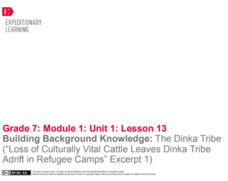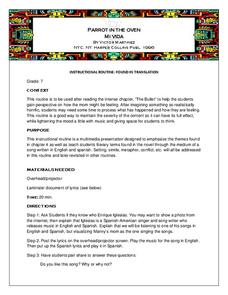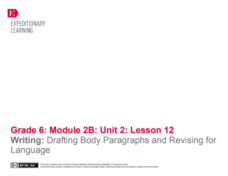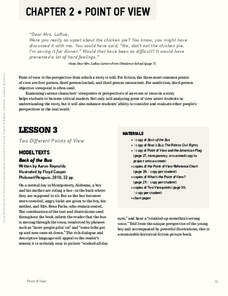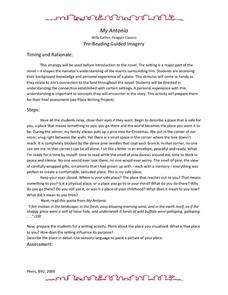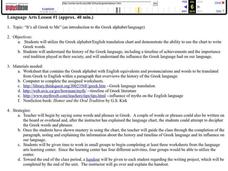EngageNY
Building Background Knowledge: The Dinka Tribe (“Loss of Culturally Vital Cattle Leaves Dinka Tribe Adrift in Refugee Camps” Excerpt 1)
Text annotations help readers track essential ideas. Pupils continue reading and annotating an informational article about Sudanese tribes, connecting it with A Long Walk to Water by Linda Sue Park. They also begin writing about their...
ESL Kid Stuff
Rooms of a House
Language learners create and label the rooms in a house and then add and label images of objects that may be found in each room.
EngageNY
Mid-Unit Assessment: Justification for Character and Scene Selection
When it comes to love and midsummer nights, confessions are tricky. Learners place themselves in the shoes of a character from William Shakespeare's A Midsummer Night's Dream and explain how a character manipulated another character in...
Curated OER
Parrot in the Oven: Instructional Routine
After reading "The Bullet," a particularly intense chapter in Victor Martinez's Parrot in the Oven: Mi Vida, class members listen to the Spanish and the English versions of "Dimelo" by Enrique Iglesias. They then discuss how the...
Pearson
Catching the Sun: Tales from Asia
Explore the folklore of Asia and the South Pacific with this language arts lesson series. Complementing a reading of Catching the Sun: Tales from Asia by Jan M. Mike, this resource supports learners with understanding cause and...
Curated OER
Creative Writing Workshop (Middle, Reading/Writing)
Bring this lesson plan into your unit about creative writing and precise language. First, middle schoolers create a piece of writing with the help of their classmates. In the second part of this workshop, they edit their own piece of...
Curated OER
Let's Go Exploring!
Use a Courbet painting of a cave or tunnel opening to reinforce the importance of descriptive writing. Writers of all ages use sensory details to describe what the scene depicts as they pretend to be in the painting. Then they imagine...
Curated OER
Simile and Metaphor
Middle schoolers use context clues to find the figurative meaning of similes and metaphors in writing. They practice using figurative language to help their writing come alive. Use this activity in a instructional activity about poetry,...
Curated OER
Lesson Plan: Sensory Exploration
Using their keen eyes and ears, learners build story observation skills which they will use to create sensory detail in their art. They note all of the things they observed on a walk, categorize them by sense, and then use the same skill...
Curated OER
Political Cartoons: Literacy
Readers decode and deconstruct political cartoons to heighten critical thinking, extra-textual literacy, and making meaning from symbolism and metaphor. A compatible activity to use in English class when your 8th or 11th graders are...
National Park Service
The Poet's Toolbox
If you need a lesson for your poetry unit, use two poems by Henry Wadsworth Longfellow ("Rain in Summer" and "The Slave in the Dismal Swamp") and a resource on Elements of Poetry. The lesson plan guides you through activities...
National Endowment for the Humanities
The Preamble to the Constitution: A Close Reading Lesson
"We the people of the United States, in order to form a more perfect union..." These familiar lines begin the Preamble to the Constitution, but do learners know what they mean? A close reading exercise takes a look at the language of the...
PBS
Explicit and Implicit Language – Interpreting the Meaning of the Fourteenth Amendment
How do Supreme Court justices interpret amendments to the Constitution? The resource helps answer that question by discussing how people use explicit and implicit language to interpret the meaning of the Fourteenth Amendment. Learners...
EngageNY
Writing to Show, Not Tell: Dialogue, Sensory Words, and Strong Action Verbs
Consume, gobble, devour ... serving up strong verbs! Writers focus on using dialogue, strong action verbs, and sensory details in their writing. After analyzing a model narrative, they apply their learning to their own hero's journey...
EngageNY
Writing: Drafting Body Paragraphs and Revising for Language
This is a formal affair. Scholars take a look at using formal writing in essays. They analyze the model essay Are We Medieval?: Opportunities in the Middle Ages and Today? They then begin working on the first draft of their own...
Scholastic
Quick as a Cricket Lesson Plan
Teaching young learners about similes is easy as pie with this primary grade language arts lesson. Following a class reading of the children's book, Quick as a Cricket by Audrey Wood, young readers learn the definition of a simile...
Scholastic
Point of View
The point of view in a story can dramatically change the story itself. Focus on finding the points of view in various reading passages with a language arts packet, which includes fiction and nonfiction text.
Curated OER
What Makes Jokes Funny?
Explore how language is used for comic effect. Middle schoolers determine which of the three formulas for jokes (double meanings, unexpected outcome, humorous mental image) make each of 18 classic, corny examples funny. They complete a...
Curated OER
My Antonia: Prereading Guided Imagery
What makes a place safe? What makes a setting effective? Explore the safe spaces and descriptive language with a prereading activity for Willa Cather's My Antonia. The teacher describes his or her own safe space and then prompts pupils...
Literacy Design Collaborative
Catching a Grenade: How Word Choice Impacts Meaning and Tone
Beyonce's "Halo" and Bruno Mars' "Grenade" provide eighth graders with an opportunity to consider how a writer's choice of words can create a very different tone even when the subject is the same. After a close reading of both lyrics,...
Curated OER
It's All Greek to Me
Introduce your class to the Greek alphabet and language. Examine how the Greek language influenced the English language. Study the history, timeline of achievements, and the role oral history played in Greece.
Curated OER
Confounding Words
Eleventh graders gain understanding of how words in the English language are formed. They assess their own work for sentence clarity and variety of expression. They increase their comprehension and recall.
Curated OER
What Do You Want To Be When You Grow Up?
Participate in authentic career research, and make effective and realistic career/academic choices entering high school. Develop communication skills, demonstrate English language arts proficiency, and share a group presentation with...
Curated OER
Diction: Formal and Informal Language
Coke or Pepsi? Is it the taste or the advertising that determines preference? As part of a study of diction, class members examine two passages, one formal and one informal, about Coca-Cola and Pepsi. In addition, they consider word...
Other popular searches
- English Language Arts
- English Language Learners
- English Language Development
- English Language Arts Exam
- English Language Arts Games
- Deaf English Language Arts
- English Language Arts Music
- English Language Skills
- English Language Arts Heroes
- English Language History
- Everyday English Language
- English Language Arts Skills


